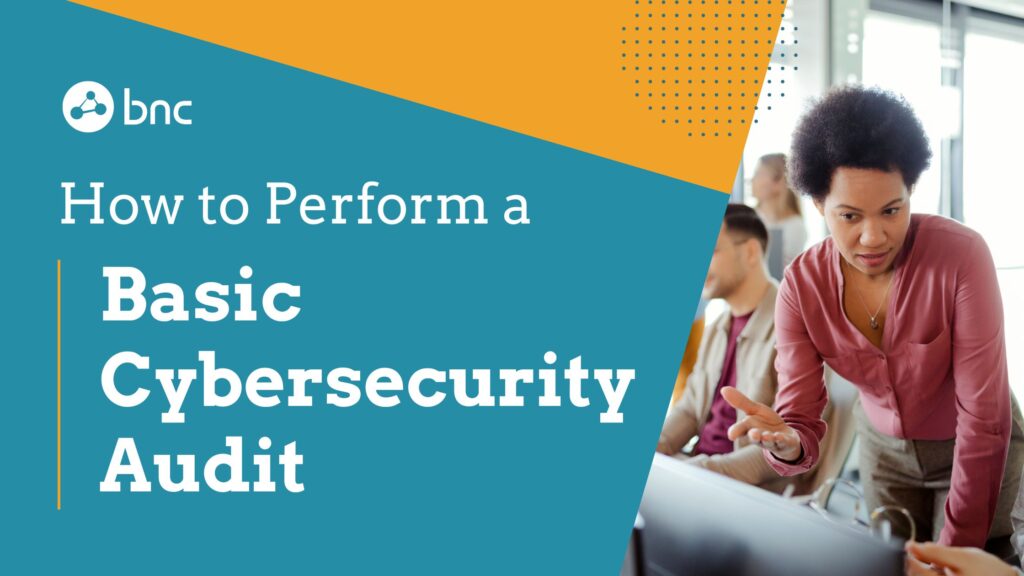
With cyber threats becoming increasingly sophisticated, businesses must take proactive steps to protect their valuable information. One essential practice is conducting regular IT cybersecurity audits. In this comprehensive guide, we’ll explore the process of conducting a cybersecurity audit and provide a step-by-step approach to help you assess and enhance your organization’s cybersecurity posture. If you’re seeking cybersecurity support, this blogpost can help you make informed decisions about securing your digital assets.
How to Perform a Basic IT Security Audit
Step 1: Define Objectives
Before you begin, establish clear objectives for your IT security audit. Determine what you want to achieve and what aspects of your IT infrastructure you wish to assess. Common objectives may include evaluating network security, assessing compliance with industry regulations, or identifying vulnerabilities.
Step 2: Inventory Your Assets
Create an inventory of all your IT assets, including hardware, software, data, and network infrastructure. Knowing what you have is the first step in securing your assets.
Step 3: Identify Risks
Once you have a complete inventory, assess potential risks associated with each asset. Identify vulnerabilities, such as outdated software, weak access controls, or unpatched systems. This process will help you prioritize your security efforts.
Step 4: Establish Audit Procedures
Determine the scope and methodology of your audit. Will it be conducted internally or by an external IT support partner? Develop a plan that outlines the audit’s objectives, the processes to be examined, and the tools to be used.
Step 5: Assess Network Security
Evaluate your network’s security measures. This includes reviewing firewalls, intrusion detection systems, and access controls. Pay attention to network segmentation and the protection of sensitive data.
Step 6: Examine Data Protection
Assess how your organization stores and protects data. Ensure that encryption is employed for sensitive data and verify that data access is restricted to authorized personnel only.
Step 7: Review User Access
Examine user access controls and permissions. Ensure that employees have access to the resources they need but are restricted from unauthorized areas. Implement strong password policies and consider multi-factor authentication (MFA) for added security.
Step 8: Evaluate Incident Response
Review your incident response plan. Ensure that your organization has a well-defined process for handling security incidents and data breaches. Test your plan’s effectiveness through simulated scenarios.
Step 9: Check for Compliance
If your business falls under specific industry regulations, such as HIPAA or GDPR, verify that you are compliant. This includes data retention policies, privacy practices, and security standards.
Step 10: Report and Remediate
After completing the audit, compile a detailed report of your findings. Highlight areas that require immediate attention and develop a remediation plan. Address vulnerabilities, update policies, and improve security measures.
Why Finding an IT Cybersecurity Consultant is Crucial for Your Audit
Conducting an IT Cybersecurity audit is a complex and critical task. Many businesses turn to IT consulting providers for assistance in this process. Here’s how IT consulting can benefit your audit:
- In-Depth Expertise: The depth of expertise that IT support professionals bring to the table is indispensable when undertaking a cybersecurity audit. Cyber threats are increasingly sophisticated, requiring a nuanced understanding of various domains within the cybersecurity landscape. IT support professionals are equipped with comprehensive knowledge in areas such as network security, application security, and threat intelligence. Their expertise enables them to meticulously identify vulnerabilities, assess potential risks, and devise effective solutions that align with industry best practices.
- External Perspective: The value of an external perspective cannot be overstated when evaluating the security posture of an organization. External IT support providers bring an unbiased viewpoint, free from internal influences or preconceptions. This impartiality is crucial for a thorough cybersecurity audit, as it ensures that vulnerabilities are identified objectively, without the potential for internal biases.
- Advanced Tools and Resources: The effectiveness of a cybersecurity audit is significantly enhanced by the advanced tools and resources that IT support teams bring to the table. These professionals have access to cutting-edge technologies designed specifically for security assessments. From penetration testing tools to vulnerability scanners, IT support teams leverage a diverse range of resources to conduct in-depth analyses of an organization’s digital infrastructure.
- Compliance Knowledge: Navigating the complex landscape of industry regulations and compliance standards is a daunting task for any organization. IT support professionals specialize in understanding and implementing these regulations. Their knowledge extends to industry-specific compliance requirements, ensuring that the cybersecurity audit aligns with regulatory standards.
- Proactive Ongoing Monitoring: Beyond the initial audit, IT support providers offer invaluable services in the form of ongoing security monitoring and support. In a threat landscape that is in a constant state of flux, continuous monitoring is crucial for maintaining a strong security posture. IT support teams utilize sophisticated tools to monitor network activity, detect anomalies, and respond promptly to emerging threats. This proactive approach ensures that security measures evolve in tandem with the dynamic nature of cyber threats, providing organizations with sustained protection against evolving risks.
Cybersecurity audits are essential for businesses seeking to protect their data and systems from cyber threats. By defining objectives, conducting a comprehensive assessment, and partnering with Cybersecurity IT support professionals like BNC, businesses can enhance their cybersecurity, safeguard their reputation, and ensure compliance with industry regulations. Regular cybersecurity audits are a proactive step in the ever-evolving landscape of IT security, helping businesses stay one step ahead of potential threats and vulnerabilities.
Get In Touch With BNC
If you’re a business in Denver, Dallas, or Austin and in need of expert cybersecurity consulting, BNC is here to assist you every step of the way. Our experienced cybersecurity professionals are ready to help you conduct a thorough audit, address vulnerabilities, and implement robust security measures to protect your digital assets. Contact us today to fortify your cybersecurity defenses and ensure your business stays resilient against evolving cyber threats. Don’t hesitate to reach out and partner with BNC to secure your digital future.
